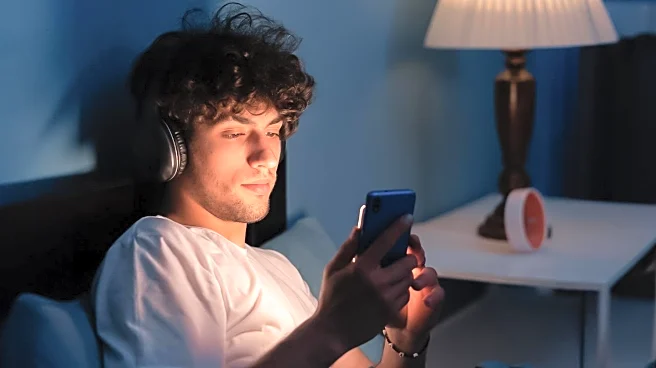What's Happening?
A group of teenagers from Bradford participated in a tech-free bedroom challenge as part of the Teen Summit, a project by Radio 5 Live and BBC Bitesize Study Support. The initiative aimed to explore the impact of removing digital devices from bedrooms on teenagers' sleep quality and overall well-being. Participants, including Elizabeth and Henry, were required to keep their technology, such as phones and gaming consoles, outside their bedrooms for five days. The challenge revealed that the absence of digital distractions led to better sleep and encouraged alternative activities like reading and spending time with family. The project also highlighted the social aspect of gaming, as Henry noted improved communication with his mother when gaming in communal spaces.
Why It's Important?
The experiment underscores the growing concern over the impact of excessive screen time on teenagers' health and daily functioning. With reports of teens feeling tired during school due to late-night smartphone usage, initiatives like this highlight the potential benefits of setting boundaries on digital device usage. Improved sleep quality can enhance academic performance and overall well-being, suggesting that similar practices could be beneficial if adopted more widely. The findings also emphasize the importance of parental involvement in setting screen time limits, as many teenagers reported a lack of such boundaries at home.
What's Next?
The results of this challenge may encourage more parents and educators to consider implementing tech-free zones or digital sabbaths to promote healthier habits among teenagers. As new rules under the Online Safety Act aim to make the internet safer for young people, there may be increased advocacy for policies that support reduced screen time. Additionally, the success of this project could inspire further research into the long-term effects of digital detoxes on youth development and mental health.
Beyond the Headlines
The challenge also sheds light on the cultural shift towards digital dependency and the need for balance in technology use. As teenagers increasingly rely on digital devices for social interaction, the experiment highlights the importance of fostering offline connections and activities. This could lead to broader discussions on digital citizenship and media literacy, equipping young people with the skills to navigate the digital world responsibly.









